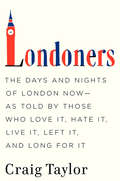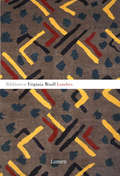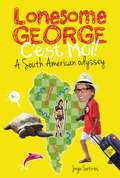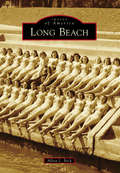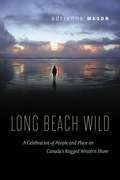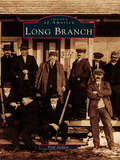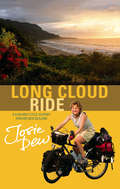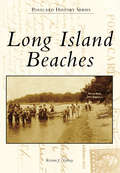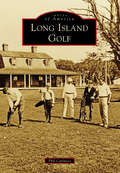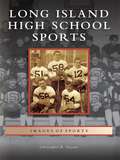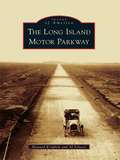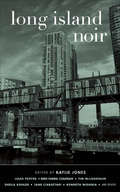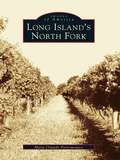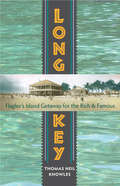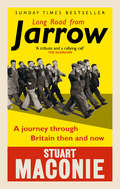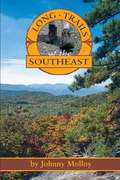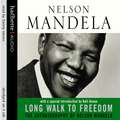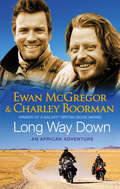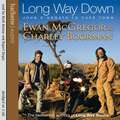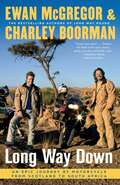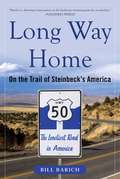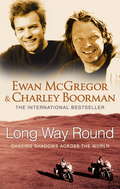- Table View
- List View
Londoners: The Days and Nights of London Now—As Told by Those Who Love It, Hate It, Live It, Left It, and Long for It
by Craig TaylorResidents tell their stories in a &“kaleidoscopic portrait of a great, messy, noisy, daunting, inspiring, maddening, enthralling, constantly shifting&” city (The New York Times Book Review).Londoners is a fresh and compulsively readable view of one of the world&’s most fascinating cities—a vibrant narrative portrait of the London of our time, featuring unforgettable stories told by the real people who make the city hum. Craig Taylor has spent years traversing every corner of the capital, getting to know the most interesting Londoners, including the voice of the London Underground, a West End rickshaw driver, an East End nightclub doorperson, a mounted soldier of the Queen&’s Life Guard at Buckingham Palace, and a couple who fell in love at the Tower of London—and now live there. With candor and humor, this diverse cast—rich and poor, old and young, native and immigrant, men and women (and even a Sarah who used to be a George)—shares indelible tales that capture the city as never before. &“Fans of Studs Terkel&’s insightful oral histories will be delighted to discover a successor in Taylor . . . His book brings London to life as it is—ever changing, ever eternal, ever unforgettable.&” —Library Journal (starred review) &“A treasury of compact vignettes from voices that are rarely heard but come closer to the truth of the city than any travel brochure or official document.&” —Pittsburgh Tribune-Review &“Delightful. . . . In Taylor&’s patient and sympathetic hands, regular people become poets, philosophers, orators.&” —The New York Times Book Review &“Remarkable.&” —San Francisco Chronicle
Londres
by Virginia WoolfEn esta pequeña joya, Virginia Woolf traza, como si del cuaderno de apuntes de un pintor se tratara, el retrato de su Londres. Pocas escritoras están tan asociadas a Londres como Virginia Woolf, que supo convertir la ciudad del Támesis en uno más de sus personajes. En este libro se reúnen seis piezas que la autora de La Sra. Dalloway escribió en 1931 para la revista Good Housekeeping sobre distintos aspectos de la vida, la arquitectura, las gentes y la historia de Londres. El primer artículo, titulado «Retrato de una londinense», se creía perdido hasta hace poco tiempo. Finalmente se encontró en una biblioteca y ahora la serie se publica completa por primera vez. En esta pequeña joya, Virginia Woolf traza, como si del cuaderno de apuntes de un pintor se tratara, el retrato de su Londres: la bruma de los muelles, la marea humana que fluye por Oxford Street, las casas de grandes escritores, los pináculos góticos de abadías y catedrales o el esplendor de la Cámara de los Comunes. Iluminados con fotografías de la época, estos textos se convierten en deliciosos paseos por una de las grandes capitales de la literatura occidental. La opinión del editor:«A veces, bastan pocas líneas para descubrir un mundo. Este es el caso de Londres, un homenaje de Virginia Woolf a la ciudad que más amaba y una oportunidad para Lumen de volver a ofrecer un título de la gran autora a nuestro público.»
Lone Survivor
by Ken HodgsonKen Hodgson, an authentic, powerfully original voice in Western fiction, returns with the most notorious story in the annals of the frontier ... In 1873, Alferd Packer led 21 men from Utah to the gold fields of Colorado. Three months later, he came back to civilization alone, guarding the terrible secret of what he had done there. To this day, no one knows what really happened on that fateful expedition ... except Packer himself. LONE SURVIVOR brilliantly recreates - from Packer's unique point of view - a tale of unforgiving terrain, of savage winter storms and dwindling food supplies, and of a desperate journey into the wilderness, where brave men died and he crossed a line few dare to cross ... Historical fiction.
Lonesome George: A South American Odyssey
by Jorge SotiriosLonesome George is a comic odyssey that combines travel adventure and comedy in a journey of epic proportions. Author Jorge Sotirios illuminates the beauty of the South American landscape, interweaving its history, culture and people, in his mock heroic quest. Beginning with the writer lured to South American by an Argentine beauty, his journey commences across the equator, through the Amazon jungle and climaxes in the austere Galapagos Islands. Incorporating angels in Argentina to sham Peruvian shaman. From Amazombies appearing on midnight boats, to visiting the lost city of Fordlandia. Accompanying ecowarriors to far -flung villages where jaguars roam, the writer ultimately finds the site of the legendary Amazon warrior women, gliding over the Mirror of the Moon Lake where everything is doubled. The alluring pink dolphin in the Amazon River, said to charm whoever encounters it, is a constant presence. Missionaries and Tarzans coexist with the cult of Che Guevara, with serious topics such as oil exploitation, deforestation and drought. Lonesome George is South America as seen from street and river level and a life- affirming portrayal of people and human emotion as Sotirios' confronts his doppelganger, "Lonesome George", the last surviving tortoise of his species.
Long Beach
by Allisa L. BeckLong Beach, Mississippi, was once known as the "radish capital of America." The famous long reds were grown in the fertile soil of the area and were shipped to all points north to be served alongside drinks in beer halls. From the town's incorporation in 1905 through the 1920s, Long Beach was a hub of the truck farming industry. Along with the famous radishes, growers cultivated pear, citrus, and pecan orchards, fields of strawberries, and other produce. Nurseries that produced lilies and gladiolas also thrived. Although the truck farming boom ended, Long Beach has continued to grow, today relying on the tourists that visit the Gulf Coast for the beautiful sandy beaches and Southern hospitality. The city has been devastated by hurricanes in its long history, from the first documented hurricane of 1909 through Hurricane Katrina, but it has persevered and continues to survive. Long Beach richly deserves its motto as the "Friendly City."
Long Beach Wild
by Adrienne MasonEach year, more than a million people visit the spectacular sweep of sand that stretches along Vancouver Island's west coast between Tofino and Ucluelet to watch waves crash ashore on a series of beaches-essentially one long beach separated by small rocky headlands, a shoreline steps away from howling wolves and towering red cedars.In Long Beach Wild: A Celebration of People and Place on Canada's Rugged Western Shore, local resident Adrienne Mason uses her intimate knowledge of the area and a selection of historic and contemporary photos to explore the region's rich natural and cultural history.Mason shows how Long Beach was shaped by many forces, including volcanoes, glaciers, and torrents of water. She describes how the deposits of gravel and silt that this tumult left behind allowed offshore kelp beds and sea otters to thrive and supported the growth of countless other organisms, from lichens and ferns to waterfowl and deer.She also describes how First Nations people found inspiration and sustenance in the area for thousands of years, hunting whales on the open ocean using harpoons with mussel-shell blades and great lengths of cedar bark rope.As well as describing the traditions of the area's First Nations, Mason
Long Branch (Images of America)
by Paul SniffenLong Branch is one of the greatest nineteenth-centuryAmerican cities. For decades it was the premier summer resort in the Northeast, and a list of visitors to the area reads like a Who's Who of the nineteenth century: Presidents Arthur, Garfield, Grant, Hayes, Harrison, McKinley, and Wilson all vacationed here, as well as Diamond Jim Brady, Lillian Russell, General Winfield Scott, Henry Ward Beecher, "Buffalo" Bill Cody, Horace Greeley, and General George Meade. Leaders in fashion, finance, theater, politics, and the military flocked to Long Branch by the hundreds because of its tremendous natural beauty, Victorian mansions and hotels, and proximity to New York, Philadelphia, and Washington, D.C.
Long Cloud Ride: A 6,000 Mile Cycle Journey Around New Zealand
by Josie DewAfter two months on board a Russian container ship sailing 15,000 miles across the world, Josie finally arrives in New Zealand with her bike. Over the next nine months she cycles 10,000 kilometres all over North and South Islands while experiencing the wettest, windiest and stormiest year on record. During this time Josie was spat at, shouted at, honked at, and both run off and blown off the road. She got soaked, sunburnt, hailed on and snowed on and was alternately starved and over-fed, over-charged and under-charged. Then there was the wildlife: the possums (both dead and alive): exotic birds such as moreporks (with their eerie call) and fantails (who decided to follow); the ostriches, who liked to chase English cyclists and the harriers, who liked to dive bomb them; the more familiar but no less frustrating farm animals, who provided sheep-jams and cow-blocks to slow Josie down. In Long Cloud Ride, Josie brings New Zealand brilliantly to life. Warm, witty and acutely observed as ever, her latest adventure is sure to delight old and new fans alike.
Long Cloud Ride: A 6,000 Mile Cycle Journey Around New Zealand
by Josie DewAfter two months on board a Russian container ship sailing 15,000 miles across the world, Josie finally arrives in New Zealand with her bike. Over the next nine months she cycles 10,000 kilometres all over North and South Islands while experiencing the wettest, windiest and stormiest year on record. During this time Josie was spat at, shouted at, honked at, and both run off and blown off the road. She got soaked, sunburnt, hailed on and snowed on and was alternately starved and over-fed, over-charged and under-charged. Then there was the wildlife: the possums (both dead and alive): exotic birds such as moreporks (with their eerie call) and fantails (who decided to follow); the ostriches, who liked to chase English cyclists and the harriers, who liked to dive bomb them; the more familiar but no less frustrating farm animals, who provided sheep-jams and cow-blocks to slow Josie down. In Long Cloud Ride, Josie brings New Zealand brilliantly to life. Warm, witty and acutely observed as ever, her latest adventure is sure to delight old and new fans alike.
Long Island Beaches (Postcard History Series)
by Kristen J. NyitrayFor centuries, Long Island's beaches have provided sustenance, relaxation, and inspiration. The coastline is renowned for its sandy Atlantic Ocean surf beaches, calm bayfront beaches, and rugged north shore Long Island Sound beaches. First inhabited by Native Americans, the area was called Sewanhacky ("Isle of Shells") in reverence to the offerings received where the water met the land. Drawing from the archives of local libraries, historical societies, museums, and private collections, Long Island Beaches presents a curated selection of vintage postcards illustrating the diversity of Nassau and Suffolk Counties' beautiful shores. Rare photographs and maps accompany the postcards to provide historical context. Through extensive research, author Kristen J. Nyitray documents a facet of Long Island's social and cultural history and the lure of its picturesque beaches.
Long Island Golf (Images of America)
by Phil CarlucciWhen the European sport of golf found its way to Long Island and took root in the Hamptons at Shinnecock Hills in 1891, its journey across the Atlantic served as the opening drive of a recreational era that now spans three centuries. Home to more than 130 golf courses, the area boasts prestigious American clubs overlooking picturesque Atlantic bays and inlets, along with public layouts climbing and descending the region's sloping terrain. Long Island is home to the most popular municipal golf facility in the country, the centerpiece of which is Bethpage Black, "the People's Country Club." Celebrated architects like A.W. Tillinghast, Devereux Emmet, Seth Raynor, and C.B. Macdonald built many of Long Island's famous courses, which have challenged the brightest of golf's stars. International tournaments and star-studded exhibitions have all been decided on Long Island turf, helping it grow into one of the world's most prominent golf settings.
Long Island High School Sports (Images of Sports)
by Christopher R. VaccaroFor nearly 120 years, Long Island has fielded high school sports teams. In that span, numerous local athletes rose to the highest level, dynasties were built, legends were made, and the nation's largest island was filled with captivating athletic stories and sports lore that will live forever. Long Island High School Sports strings together a pictorial history of Long Island's oldest, most famous, and well-respected teams, coaches, and athletes.
Long Island Motor Parkway, The (Images of America)
by Howard Kroplick Al VelocciA forerunner of the modern highway system, the Long Island Motor Parkway was constructed during the advent of the automobile and at a pivotal time in American history. Following a spectator death during the 1906 Vanderbilt Cup Race, the concept for a privately owned speedway on Long Island was developed by William K. Vanderbilt Jr. and his business associates. It would be the first highway built exclusively for the automobile. Vanderbilt's dream was to build a safe, smooth, police-free road without speed limits where he could conduct his beloved automobile races without spectators running onto the course. Features such as the use of reinforced concrete, bridges to eliminate grade crossings, banked curves, guardrails, and landscaping were all pioneered for the parkway. Reflecting its poor profitability and the availability of free state-built public parkways, the historic 48-mile Long Island Motor Parkway closed on Easter Sunday, April 17, 1938.
Long Island Noir: Long Island Noir (Akashic Noir Ser.)
by Kaylie Jones"The Shiny Car in the Night" by Nick Mamatas has been selected for inclusion in The Best American Mystery Stories 2013, edited by Otto Penzler and Lisa Scottoline"There is plenty of mayhem for fans of dark fiction in the pages of Long Island Noir: shootings, killings, all manner of brutality...Suburbia may be even meaner than the big city."--The New York Times"Akashic's Long Island volume in its regional noir series offers an eclectic and effective mix of seasoned pros (Reed Farrel Coleman, Tim McLoughlin, Sarah Weinman) and new voices (Qanta Ahmed, JZ Holden, Amani Scipio). The 17 contributors portray a wonderful diversity of people driven to extremes . . ."--Publishers WeeklyOriginal stories by: Jules Feiffer, Matthew McGevna, Nick Mamatas, Kaylie Jones, Qanta Ahmed, Charles Salzberg, Reed Farrel Coleman, Tim McLoughlin, Sarah Weinman, JZ Holden, Richie Narvaez, Sheila Kohler, Jane Ciabattari, Steven Wishnia, Kenneth Wishnia, Amani Scipio, and Tim Tomlinson.Kaylie Jones moved to Sagaponack, New York, in 1975, where her family continued to live for more than thirty years. She is the author of five novels, including A Soldier's Daughter Never Cries and the memoir Lies My Mother Never Told Me. She teaches in the MFA program at Stony Brook Southampton and in the Wilkes University low-residency MFA program in professional writing.
Long Island's North Fork (Images of America)
by Maria Orlando PietromonacoBoasting a verdant landscape and miles of silky white beaches, Long Island's North Fork remains a natural paradise. Escaping the urbanization that overspread much of Long Island in the early 1900s, the rural villages survived on farming, fishing, shipbuilding, and maritime trading. Loyal residents have preserved the North Fork's rich heritage and tranquil pace of life. Thus, agriculture still thrives and boats continue to cruise the crystal-clear waters.Long Island's North Fork explores the past through the eyes of those who lived in the rustic countryside. It is a treasury of photographs, many taken by professionals, others from selected family albums and collections.
Long Key: Flaglers Island Getaway for the Rich and Famous
by Thomas Neil KnowlesWith a modest two-story hotel and various small cottages, Long Key Fishing Camp offered a dramatic departure from the usual opulence of Henry Flagler’s hotels that dotted the east coast of Florida. The final resort opened during his lifetime, Long Key lacked palatial structures with manicured grounds, extravagant recreational facilities, and world-class amenities. Prospective visitors were frankly warned not to expect the same level of comfort provided at sister properties. Yet still they came.Carefully researched and replete with photographs and maps never before published, Long Key offers the first history of this unique destination. Historian Thomas Knowles recounts the extraordinary tale of how a railroad work camp became a world-renowned sportfishing center and a preferred vacation spot of a cadre of well-to-do individuals that included businessmen, poets, nobles, and politicians.This rustic island, with its unparalleled fishing grounds and cabins named after local fish—“The Kingfish,” “The Porpoise,” “The Barracoota,” “The Shark”—inspired fierce loyalty among its clientele, even during the dark years of the Great Depression. Zane Grey, Lou Gehrig, Wallace Stevens, Charles Kettering, Andrew Mellon, and Herbert Hoover were among those who would return season after season.Completely destroyed by the fatal 1935 Labor Day Hurricane, the first category 5 storm to make landfall in the United States, Flagler’s unique island getaway has been largely forgotten. Knowles expertly depicts this slice of long-lost Florida and resurrects the famous personalities who found refuge from the limelight at Long Key.
Long Road from Jarrow: A journey through Britain then and now
by Stuart MaconieThe Sunday Times Bestseller'A tribute and a rallying call' - GuardianThree and half weeks. Three hundred miles. I saw roaring arterial highway and silent lanes, candlelit cathedrals and angry men in bad pubs. The Britain of 1936 was a land of beef paste sandwiches and drill halls. Now we are nation of vaping and nail salons, pulled pork and salted caramel.In the autumn of 1936, some 200 men from the Tyneside town of Jarrow marched 300 miles to London in protest against the destruction of their towns and industries. Precisely 80 years on, Stuart Maconie, walks from north to south retracing the route of the emblematic Jarrow Crusade. Travelling down the country’s spine, Maconie moves through a land that is, in some ways, very much the same as the England of the 30s with its political turbulence, austerity, north/south divide, food banks and of course, football mania. Yet in other ways, it is completely unrecognisable. Maconie visits the great cities as well as the sleepy hamlets, quiet lanes and roaring motorways. He meets those with stories to tell and whose voices build a funny, complex and entertaining tale of Britain, then and now.
Long Trails of the Southeast
by Johnny MolloyBackpackers and hikers looking for less crowded outdoor experience should grab Long Trails of the Southeast to discover the many opportunities available in the Deep South. This guide covers 600 miles of trails in 6 states, including the 104-mile Pinhoti Trail, the 90-mile Benton MacKaye Trail, and 171 miles of the Florida Trail.
Long Walk To Freedom
by Nelson MandelaThe riveting memoirs of the outstanding moral and political leader of our time, A LONG WALK TO FREEDOM brilliantly re-creates the drama of the experiences that helped shape Nelson Mandela's destiny. Emotive, compelling and uplifting, A LONG WALK TO FREEDOM is the exhilarating story of an epic life; a story of hardship, resilience and ultimate triumph told with the clarity and eloquence of a born leader.'Burns with the luminosity of faith in the invincible nature of human hope and dignity ... Unforgettable' Andre Brink 'Enthralling ... Mandela emulates the few great political leaders such as Lincoln and Gandhi, who go beyond mere consensus and move out ahead of their followers to break new ground' Donald Woods in the SUNDAY TIMES
Long Way Down
by Charley Boorman Ewan McGregorAfter their fantastic trip round the world in 2004, fellow actors and bike fanatics Ewan McGregor and Charley Boorman couldn't shake the travel bug. And after an inspirational UNICEF visit to Africa, they knew they had to go back and experience this extraordinary continent in more depth. And so they set off on their 15,000-mile journey with two new BMWs loaded up for the trip. Joining up with producer/directors Russ Malkin and David Alexanian and the Long Way Round team, their route took them from John O'Groats at the northernmost tip of Scotland to Cape Agulhas on the southernmost tip of South Africa. Riding through spectacular scenery, often in extreme temperatures, Ewan and Charley faced their hardest challenges yet. With their trademark humour and honesty they tell their story - the drama, the dangers and the sheer exhilaration of riding together again, through a continent filled with magic and wonder.
Long Way Down
by Charley Boorman Ewan McGregorAfter their fantastic trip round the world in 2004, fellow actors and bike fanatics Ewan McGregor and Charley Boorman couldn't shake the travel bug. And after an inspirational UNICEF visit to Africa, they knew they had to go back and experience this extraordinary continent in more depth. And so they set off on their 15,000-mile journey with two new BMWs loaded up for the trip. Joining up with producer/directors Russ Malkin and David Alexanian and the Long Way Round team, their route took them from John O'Groats at the northernmost tip of Scotland to Cape Agulhas on the southernmost tip of South Africa. Riding through spectacular scenery, often in extreme temperatures, Ewan and Charley faced their hardest challenges yet. With their trademark humour and honesty they tell their story - the drama, the dangers and the sheer exhilaration of riding together again, through a continent filled with magic and wonder.
Long Way Down
by Charley Boorman Ewan McGregor** INCLUDES EXCLUSIVE INTERVIEW WITH CHARLEY BOORMAN **After chasing their shadows across the world, journeying east from London to New York, actors (and bike fanatics) Ewan McGregor and Charley Boorman couldn't shake the travel bug. And after an inspirational UNICEF visit to Africa, they realised their new destination could be nowhere else. With the Long Way Round team assembled once again and with two new BMWs loaded up for the journey, Ewan and Charley are setting off for a very different challenge - the Long Way Down. On this new adventure they will travel from John O'Groats to South Africa: biking their way down through Scotland and England, then travelling into Europe and further down into Africa. Visiting UNICEF projects on the African continent along their way, they will come face-to-face with spectacular but unforgiving terrain, with rich cultures and unforgettable local characters. Ewan and Charley will test their endurance, biking skills and friendship to the limits on this amazing trip.
Long Way Down: An Epic Journey by Motorcycle from Scotland to South Africa
by Ewan Mcgregor Charley BoormanEighteen countries. Five shock absorbers. Two bikers. One amazing adventure... After their fantastic trip round the world in 2004, fellow actors and bike fanatics Ewan McGregor and Charley Boorman couldn't shake the travel bug. Inspired by their UNICEF visits to Africa, they knew they had to go back and experience this extraordinary continent in more depth. And so they set off on their 15,000-mile journey with two new BMWs loaded up for the trip. Their route took them from John O'Groats at the northernmost tip of Scotland to Cape Agulhas on the southernmost tip of South Africa. Along the way they rode some of the toughest terrain in the world -- and met some of the friendliest people. They rode their bikes right up to the pyramids in Egypt and visited Luke Skywalker's house in Tunisia. They met people who had triumphed over terrifying experiences -- former childhood soldiers in Uganda and children living amidst the minefields of Ethiopia. They had a close encounter with a family of gorillas in Rwanda and were nearly trampled by a herd of elephants in Botswana. Riding through spectacular scenery, often in extreme temperatures, Ewan and Charley faced their hardest challenges yet. With their trademark humor and honesty they tell their story -- the drama, the dangers and sheer exhilaration of riding together again, through a continent filled with magic and wonder.
Long Way Home: On the Trail of Steinbeck's America
by Bill Bairch“We do not take a trip; a trip takes us,” John Steinbeck noted in his 1962 classic, Travels with Charley. In 2008, Bill Barich decided to explore the mood of the United States as Steinbeck had done almost a half century before. He set off on a 5,943 mile cross-country drive from New York to his old hometown of San Francisco on Route 50, a road twisting through the American heartland. Long Way Home is the stunning result of his pilgrimage. From the Eastern Shore of Maryland to the spectacular landscape of Moab, Utah, to Steinbeck’s own Salinas Valley, the book is filled with memorable encounters and rich in history and local color; a truthful, inspired account of a once-in-a-lifetime trip. It offers an incisive portrait of a nation divided and the grassroots dissatisfaction that ultimately catapulted Donald Trump into the White House. From the Eastern Shore of Maryland to the spectacular landscape of Moab, Utah, to Steinbeck's own Salinas Valley, filled with memorable encounters and redolent with history and local color, Long Way Home is a truthful, inspiring account of the country at a social and political crossroad.
Long Way Round
by Charley Boorman Ewan McGregor'A highly readable and spiritually uplifting book about a dream come true' Wanderlust 'Touching and memorable ... one for armchair travellers and bike freaks' Daily MailFrom London to New York, Ewan and Charley chased their shadows through Europe, the Ukraine, Kazakhstan, Mongolia and Russia, across the Pacific to Alaska, then down through Canada and America. But as the miles slipped beneath the tyres of their big BMWs, their troubles started. Exhaustion, injury and accidents tested their strength. Treacherous roads, unpredictable weather and turbulent politics challenged their stamina. They were chased by paparazzi in Kazakhstan, courted by men with very large guns in the Ukraine, hassled by the police, and given bulls' testicles for supper by Mongolian nomads. And yet despite all these obstacles they managed to ride more than twenty thousand miles in four months, changing their lives forever in the process. As they travelled they documented their trip, taking photographs, and writing diaries by the campfire. Long Way Round is the result of their adventures - a fascinating, frank and highly entertaining travel book about two friends riding round the world together and, against all the odds, realising their dream.
